|
|
|
Sort Order |
|
|
|
Items / Page
|
|
|
|
|
|
|
| Srl | Item |
| 1 |
ID:
140357


|
|
|
|
|
| Summary/Abstract |
Following the 1990–91 Gulf War and the subsequent March 1991 uprising, the Iraqi government launched a brutal counterinsurgency campaign in the marshes of southern Mesopotamia. Alongside mass killing and forced population resettlement, the state used hydrological infrastructure to divert water from the wetlands, permanently desiccating the area. Using newly available Iraqi government archives, this paper argues that the destruction of the marshes was the result of a complex interplay between sectarianism, development planning, and security imperatives. Inhabited by peripatetic Marsh Arabs (Maʿdan), the marshlands stood out as an impenetrable wilderness. Baʿth policies in the marshes combined measures meant to promote social and economic modernization with counterinsurgency tactics meant to achieve control over the marsh region. After 1991, the regime set out to obliterate a terrain it deemed a strategic liability and a population that seemed an obstacle to modernization.
|
|
|
|
|
|
|
|
|
|
|
|
|
|
|
|
| 2 |
ID:
083039
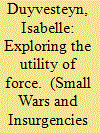

|
|
|
|
|
| Publication |
2008.
|
| Summary/Abstract |
This conclusion looks at the debate about the utility of force. It brings together the conclusions of the contributions in this special volume, linking them together with the positions in the debate and outlining further avenues for research.
|
|
|
|
|
|
|
|
|
|
|
|
|
|
|
|
| 3 |
ID:
193823


|
|
|
|
|
| Summary/Abstract |
During the twenty-five years I had the privilege of serving in the United Nations, I came—like so many others—to regard the UN as one of our century’s most remarkable institutions.
The UN has defined and shaped multilateral action in ways that were unimaginable before its creation. Its track record in the management of relationships between UN Member States is particularly impressive. During its nearly eighty years as a global institution, the UN has been far more successful at facilitating relations between great powers, channeling and accommodating the expectations of emerging and regional powers, accompanying nations as they become new states, and stabilizing fragile states than it is generally given credit.
|
|
|
|
|
|
|
|
|
|
|
|
|
|
|
|
| 4 |
ID:
165615
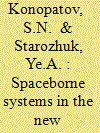

|
|
|
|
|
| Summary/Abstract |
This article analyses the objects of destruction, dynamism in creation of space systems, dialectics of protection and destruction technologies, as well as their legal background, and possible development.
|
|
|
|
|
|
|
|
|
|
|
|
|
|
|
|
| 5 |
ID:
174976
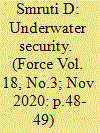

|
|
|
| 6 |
ID:
117689
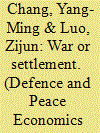

|
|
|
|
|
| Publication |
2013.
|
| Summary/Abstract |
This paper presents an economic analysis of the optimal choice between war and settlement when armed conflicts involve weapon costs and endogenously increasing destruction to consumable resources. In contrast to some earlier findings in the conflict literature, we derive conditions under which war dominates settlement as the Nash equilibrium choice in a one-period game without incomplete information or misconceptions. These conditions are shown to depend not only on resources allocated to the production of military weapons, but also on the endogenous destructiveness of weapons used in warfare. We show that contending parties always allocate more resources to arms productions under settlement (in the shadow of conflict) than under war. When total destruction is less than the difference in arms productions between settlement and war, each party's expected payoff is relatively higher under war. As a result, war dominates settlement. But, when total destruction is greater than the difference in arms productions between settlement and war, each party's expected payoff is relatively higher under settlement. In this case, settlement dominates war and the larger scale of destructiveness associated with higher arms levels generates an effective deterrence for 'armed peace'. One implication of the positive analysis is that, under the threat of conflict, arms reductions for promoting peace can never be voluntary.
|
|
|
|
|
|
|
|
|
|
|
|
|
|
|
|
| 7 |
ID:
152962
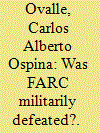

|
|
|
|
|
| Summary/Abstract |
The concept of military victory has become opaque and quite different from the days of the industrial wars. Full military victory through total annihilation of the enemy has yielded to more complex ways of achieving political objectives. Eventually the understanding of the fact that the war is unwinnable on martial terms shifts insurgent strategy to one of survival, normally peace talks. It is this very shift of strategy, albeit the absence of insurgent annihilation, that constitutes the core of military victory for the government. Politicians and decision makers, if not military forces, blinded by the victory idea of the past, are unable to understand this reality. Hence, when peace talks are held, they are approached as the end of conflict rather than a shift to war by other means. This gives the upper hand to the insurgents.
|
|
|
|
|
|
|
|
|
|
|
|
|
|
|
|
|
|
|
|
|